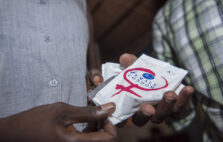Shanita, a 23-year-old woman living with HIV, is a sex worker in Ntungamo District in southwest Uganda. She is aware of her HIV status and adheres to her antiretroviral therapy. Unlike many of her peers, Shanita uses contraceptives. She was fearful of family planning at first because of local misconceptions that they can cause infertility or other health problems. But the midwives at her community health centre provided education and counseling, and she decided to try it.
“I chose to start using contraception after the birth of my child [now 2 years old],” says Shanita. “I preferred to prevent unwanted pregnancies [and to] live a healthy and stress-free life. I went for an IUD [intrauterine device] because it does not cause hormonal changes or alter body systems which changes might affect my sexual feelings. I am no longer afraid about family planning because it has not caused me any health problems. Those who allege that family planning causes problems such as back pain or headache are those who have never used any family planning method and have little knowledge about it.”
Shanita has now embarked on sensitizing her peers on the use of family planning. Initially many were hesitant, fearing that the rumors about contraceptives were true, but eventually most of them started to use them. Shanita notes that most women in her trade are in their 20s or early 30s and often lack awareness and are ignorant about the benefits of family planning.
Our group is usually neglected, and yet young women in this trade need sensitization. Shanita, 23
“Our group is usually neglected, and yet teenagers and young women in this trade need sensitization on use of family planning,” says Shanita. “Many of us may not have stable families hence unwanted pregnancies are likely to occur, a thing that’s not good for us or the babies.”
She also advised that women in stable families be educated about family planning and that their husbands be sensitized about contraceptive use.
“Normally men are against the use of family planning by their wives which deters use; these men need to be aware—and workshops targeting and involving only men should be organized especially at village level by local council chairpersons and village health teams.”
Shanita also notes that over the past year and a half, the COVID-19 pandemic has reduced access to family planning services and that measures need to be taken to ensure that she and her peers can continue to easily obtain contraceptives.
“Most of my colleagues moved back to the villages [because of COVID-19], and some of them haven’t returned,” says Shanita. “I stayed around town, but due to the fear that the environment around health centres would expose us to more risk of contracting COVID-19, our visits to health facilities for family planning services became less frequent. Free condoms became fewer because government concentrated on controlling the spread of COVID-19, and that is why there are likely to be more unwanted pregnancies during this pandemic than before. Also, transport services to the health centres required authorization from the local councils and resident district commissioners. This bureaucracy made it an uphill task to secure permission to even access health care.”
Shanita says that challenges in access need to be overcome and that all sexually active women should be educated in family planning and use it as needed to prevent unwanted pregnancies and to secure healthy and happy lives.








